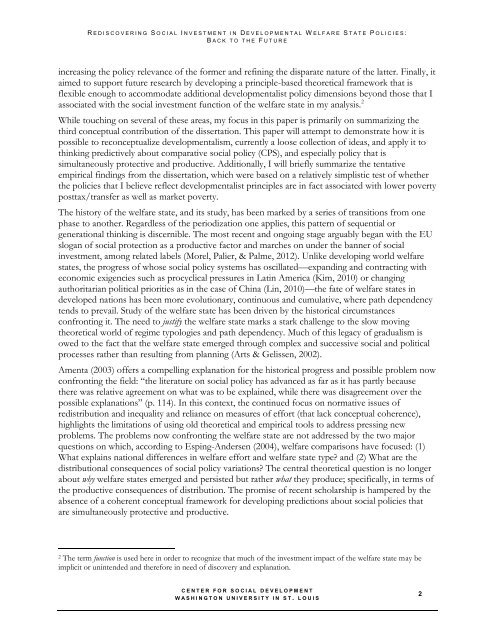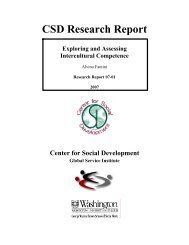Rediscovering social investment in developmental welfare state ...
Rediscovering social investment in developmental welfare state ...
Rediscovering social investment in developmental welfare state ...
Create successful ePaper yourself
Turn your PDF publications into a flip-book with our unique Google optimized e-Paper software.
R E D I S C O V E R I N G S O C I A L I N V E S T M E N T I N D E V E L O P M E N T A L W E L F A R E S T A T E P O L I C I E S :<br />
B A C K T O T H E F U T U R E<br />
<strong>in</strong>creas<strong>in</strong>g the policy relevance of the former and ref<strong>in</strong><strong>in</strong>g the disparate nature of the latter. F<strong>in</strong>ally, it<br />
aimed to support future research by develop<strong>in</strong>g a pr<strong>in</strong>ciple-based theoretical framework that is<br />
flexible enough to accommodate additional <strong>developmental</strong>ist policy dimensions beyond those that I<br />
associated with the <strong>social</strong> <strong><strong>in</strong>vestment</strong> function of the <strong>welfare</strong> <strong>state</strong> <strong>in</strong> my analysis. 2<br />
While touch<strong>in</strong>g on several of these areas, my focus <strong>in</strong> this paper is primarily on summariz<strong>in</strong>g the<br />
third conceptual contribution of the dissertation. This paper will attempt to demonstrate how it is<br />
possible to reconceptualize <strong>developmental</strong>ism, currently a loose collection of ideas, and apply it to<br />
th<strong>in</strong>k<strong>in</strong>g predictively about comparative <strong>social</strong> policy (CPS), and especially policy that is<br />
simultaneously protective and productive. Additionally, I will briefly summarize the tentative<br />
empirical f<strong>in</strong>d<strong>in</strong>gs from the dissertation, which were based on a relatively simplistic test of whether<br />
the policies that I believe reflect <strong>developmental</strong>ist pr<strong>in</strong>ciples are <strong>in</strong> fact associated with lower poverty<br />
posttax/transfer as well as market poverty.<br />
The history of the <strong>welfare</strong> <strong>state</strong>, and its study, has been marked by a series of transitions from one<br />
phase to another. Regardless of the periodization one applies, this pattern of sequential or<br />
generational th<strong>in</strong>k<strong>in</strong>g is discernible. The most recent and ongo<strong>in</strong>g stage arguably began with the EU<br />
slogan of <strong>social</strong> protection as a productive factor and marches on under the banner of <strong>social</strong><br />
<strong><strong>in</strong>vestment</strong>, among related labels (Morel, Palier, & Palme, 2012). Unlike develop<strong>in</strong>g world <strong>welfare</strong><br />
<strong>state</strong>s, the progress of whose <strong>social</strong> policy systems has oscillated—expand<strong>in</strong>g and contract<strong>in</strong>g with<br />
economic exigencies such as procyclical pressures <strong>in</strong> Lat<strong>in</strong> America (Kim, 2010) or chang<strong>in</strong>g<br />
authoritarian political priorities as <strong>in</strong> the case of Ch<strong>in</strong>a (L<strong>in</strong>, 2010)—the fate of <strong>welfare</strong> <strong>state</strong>s <strong>in</strong><br />
developed nations has been more evolutionary, cont<strong>in</strong>uous and cumulative, where path dependency<br />
tends to prevail. Study of the <strong>welfare</strong> <strong>state</strong> has been driven by the historical circumstances<br />
confront<strong>in</strong>g it. The need to justify the <strong>welfare</strong> <strong>state</strong> marks a stark challenge to the slow mov<strong>in</strong>g<br />
theoretical world of regime typologies and path dependency. Much of this legacy of gradualism is<br />
owed to the fact that the <strong>welfare</strong> <strong>state</strong> emerged through complex and successive <strong>social</strong> and political<br />
processes rather than result<strong>in</strong>g from plann<strong>in</strong>g (Arts & Gelissen, 2002).<br />
Amenta (2003) offers a compell<strong>in</strong>g explanation for the historical progress and possible problem now<br />
confront<strong>in</strong>g the field: ―the literature on <strong>social</strong> policy has advanced as far as it has partly because<br />
there was relative agreement on what was to be expla<strong>in</strong>ed, while there was disagreement over the<br />
possible explanations‖ (p. 114). In this context, the cont<strong>in</strong>ued focus on normative issues of<br />
redistribution and <strong>in</strong>equality and reliance on measures of effort (that lack conceptual coherence),<br />
highlights the limitations of us<strong>in</strong>g old theoretical and empirical tools to address press<strong>in</strong>g new<br />
problems. The problems now confront<strong>in</strong>g the <strong>welfare</strong> <strong>state</strong> are not addressed by the two major<br />
questions on which, accord<strong>in</strong>g to Esp<strong>in</strong>g-Andersen (2004), <strong>welfare</strong> comparisons have focused: (1)<br />
What expla<strong>in</strong>s national differences <strong>in</strong> <strong>welfare</strong> effort and <strong>welfare</strong> <strong>state</strong> type? and (2) What are the<br />
distributional consequences of <strong>social</strong> policy variations? The central theoretical question is no longer<br />
about why <strong>welfare</strong> <strong>state</strong>s emerged and persisted but rather what they produce; specifically, <strong>in</strong> terms of<br />
the productive consequences of distribution. The promise of recent scholarship is hampered by the<br />
absence of a coherent conceptual framework for develop<strong>in</strong>g predictions about <strong>social</strong> policies that<br />
are simultaneously protective and productive.<br />
2 The term function is used here <strong>in</strong> order to recognize that much of the <strong><strong>in</strong>vestment</strong> impact of the <strong>welfare</strong> <strong>state</strong> may be<br />
implicit or un<strong>in</strong>tended and therefore <strong>in</strong> need of discovery and explanation.<br />
C E N T E R F O R S O C I A L D E V E L O P M E N T<br />
W A S H I N G T O N U N I V E R S I T Y I N S T . L O U I S<br />
2
















